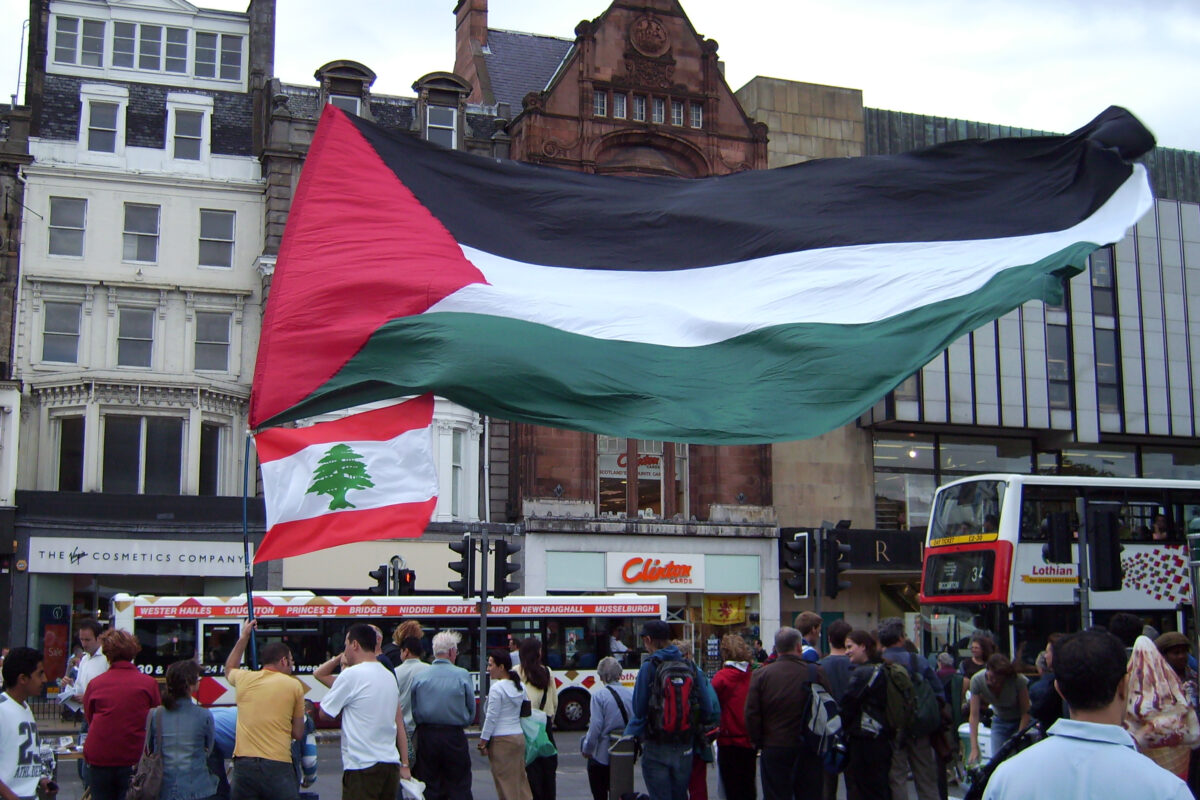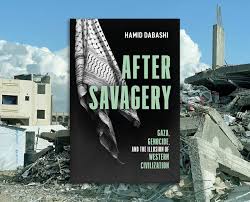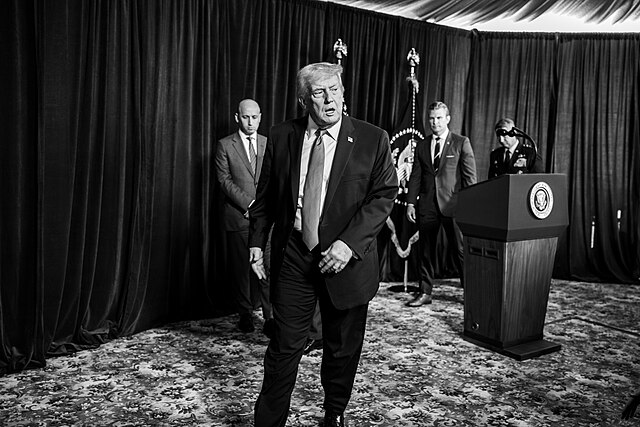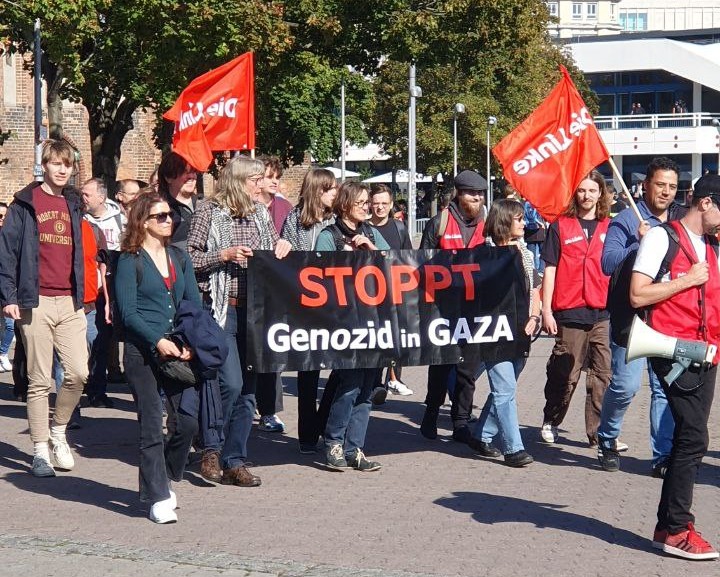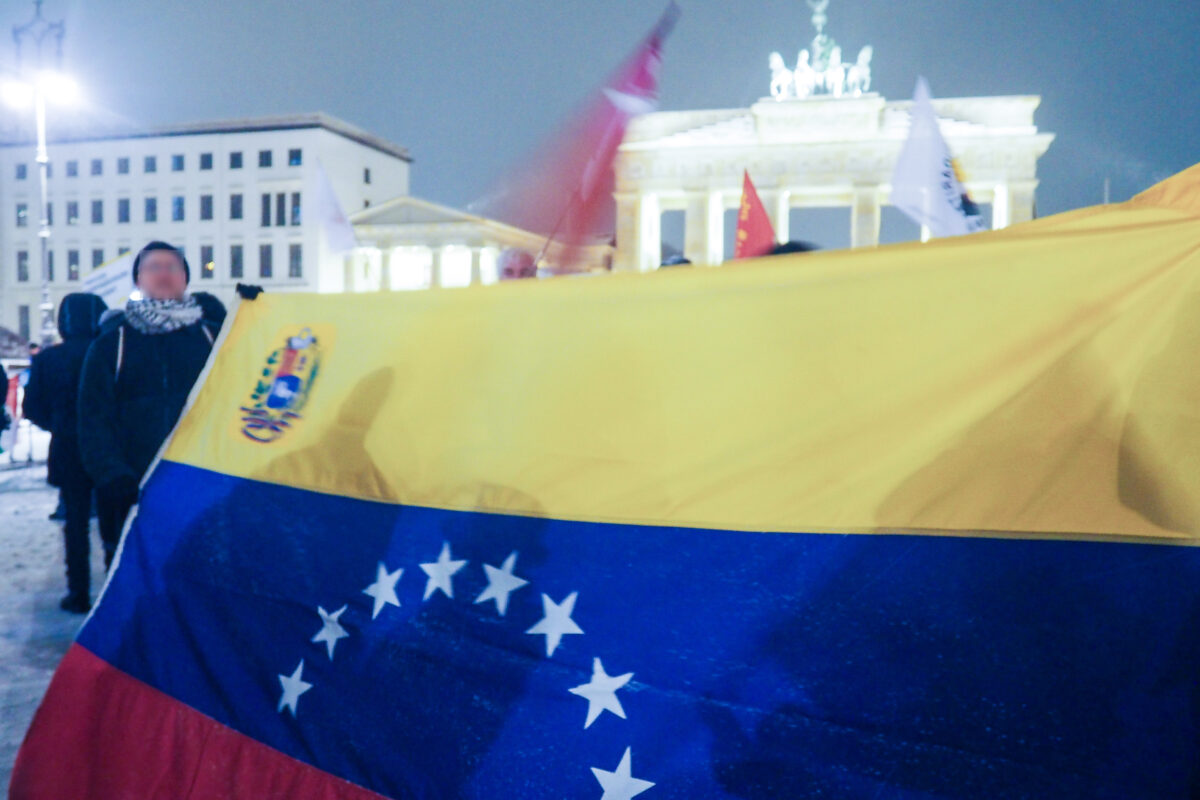Thanks for talking to us. Could you briefly introduce yourself?
I’m Jean-Michael. I come from Lebanon where I grew up in with kind of a Westernized mindset. I went to a school where we learned the French Baccalaureate system in parallel with the Lebanese system. I came to Germany to get my masters in robotics.
Since the seventh of October, I had a radical switch in how I look at the world in general, but especially at Europe, in particular Germany, which I thought was a country of human rights.
It’s just about a year since 7th October, but in the last weeks, Israel has extended it’s war into Lebanon
I wouldn’t say I’m surprised that it has gone in this direction, because the State of Israel is based on Zionism, and Zionism is, by nature, expansionist. But it worries me more because it touches closer to home.
Lebanon was not constantly occupied in the way that Palestine is occupied and colonized. Divisions grew after the so-called independence from the French – they managed to divide us very well. So I worry about the Israeli attacks, but I also worry about the solidarity and unity of the people to resist and fight the aggression.
A couple of days ago I read an interview with Lebanese socialist Simon Assaf, who said that the attacks of Lebanon have united Lebanon in a way that hasn’t been possible in the last few decades
I could see this. I also look at the group of friends who grew up with. A lot of people understood the nature, the background, and the history of Hezbollah, even though we, as Lebanese people, have also lived through terrible experiences with Hezbollah – not because they’re “terrorists”, but because they’re a party in power just like the other parties.
For example, during the 2019 uprising, we were repressed and oppressed by all the parties. Hezbollah were maybe the most violent because they have the tools for that.
So, Hezbollah is not a socialist organisation and it played a terrible role in Syria. But they are now under attack from Israel. What attitude should socialists take towards Hezbollah?
We should be aware of the history of Hezbollah. It grew up as a movement from below, because the Shia community was very much isolated and oppressed during the Civil War. They were heavily affected when the Israelis invaded.
But as Hezbollah grew into a political party and integrated into the political class in Lebanon, its radical stances got diluted. They definitely played a terrible role in Syria that could not align with our values as internationalists.
But at the moment, they are the resistance, and as socialists, I think we should stand behind them, not because they are Hezbollah but because we should stand behind the resistance.
Some people, especially in Germany, are saying that Israel’s attack on Hezbollah and the killing of Nasrallah are legitimate because of their links with Iran.
There were always some exchanges of fire between Hezbollah and Israel whenever either the government in Israel or the party in Lebanon started to lose popularity, just to remind the people why they are there.
But you can’t carpetbomb the middle of a city just because Hezbollah exists there. I think the reaction of Hezbollah to the genocidal escalation on Gaza was legitimate as they did not attack Israel in its so called territories, but in the Sheba’a – the occupied Lebanese territories controlled by Israel. It is a totally valid approach to wake up resistance there.
It was very clear that Israel’s plan was to make the so-called buffer zones unliveable. They started by burning trees and using phosphorous bombs, to make the land uncultivable. People who make a living from the land by selling oil, olives, or soap now cannot live from it. They will be pushed away. I believe that the Zionists would then want to step in and colonize part of the Lebanese territories.
What’s everyday like life in Lebanon at the moment?
1 million people are already internally displaced. People from the South came to Beirut, thinking Beirut would be safe. But now the Israelis are sending messages to stay away from any property of Hezbollah without people knowing what that means.
They’ve been sending messages on Twitter at 3am where people are sleeping, saying that people should get out of their area. I’ve seen images of people on the streets and public places, with none of their belongings. The situation is quite ridiculous.
This is on top of the divisions I was talking about earlier. For example, refugees from Syria and Palestine are not receiving the same aid and support as the Lebanese people, because the organizations on the ground discriminate in favour of people from Lebanon.
All this is where Hezbollah is part of the government. Why are they seen as speaking for the resistance? Is the Lebanese Left not able to provide an alternative leadership?
In the Lebanese uprising, I don’t remember any concrete Left forming. People were very niched in support for the sectarian parties that came out of the Civil War. The result was groups of militias fighting against each other.
There’s no organised Left which is able to offer an alternative. But people are coming together, trying to help each other in every way they can, which is really nice. They are showing solidarity, and are hopefully getting more aware about the situation with Hezbollah.
At the same time, there’s the elitist mindset that still looks up to Europe. The people who emerged from the Fascist movement in the Civil War – the Phalanges – still have the same very racist mindset, thinking that Lebanon should be purely Lebanese. And they look to Europe for civilization.
But I think people are waking up and realizing that the heavy silence from the people in power and the media about Palestine is very similar when it comes to Lebanon. People who at first could not sympathize with the Palestinians are now realizing that it was not about Hamas.
During the Civil War, some Lebanese experienced attacks by the PLO, who have not always made the best decisions within the Lebanese community. But now they realize it’s not about the Palestinian people. It’s more about us as Arabs, as Lebanese and Palestinians and Syrians. We’re all put in the same box and our blood is not seen to matter as much as that of people of Europe and the US.
Why do you think Israel is attacking Lebanon? Don’t they have too much on their hands already with Gaza?
In Gaza, they have failed to reach any of their objectives. It was always clear that it was not about the hostages or even about 7th October. Those were excuses to carry out the genocide and to make Gaza unliveable.
We see a similar parallel in Lebanon, where they say it’s about Hezbollah. Now that they have taken down Nasrallah, they’re still striking very heavily at Beirut, but also at the Beqaa valley. We should not forget about the Beqaa, even though it’s spoken about less.
The attack on Lebanon is meant to distract, while Israel carries on with its genocidal campaign in Gaza, and escalates in the West Bank. It is an example both of Israel’s failures and also of its ongoing colonization of Palestine.
There’s a theory that Israel attacked Lebanon to try and bring the US more actively into the war.
Yeah. Israel has lost a lot of legitimacy with its allies, who are starting to realise that they cannot support them as much as they did in the beginning. So it’s in Israel’s advantage to go into a bigger war by escalating towards Lebanon, and maybe hoping that Iran gets involved. This could win them more support from the US and the European countries.
Israel is also not doing well economically. They need economic support from the US to keep the whole project living and to keep colonizing more and more of Palestine.
We have elections coming up in the US and Kamala Harris has made a turn. She’s now expressing sympathy for Palestinians at the same time as continuing to support sending weapons to Israel. What is Harris’s attitude towards Lebanon and Lebanese people?
They want a ceasefire to pacify the movement against Harris and the Democrats. But at the same time they’re sending more money. Similarly, they call for a ceasefire in Lebanon and say they don’t want any sort of escalation. But again, they’ve sent $8.7 billion in military aid to Israel.
They’re still doing the same thing that they did when there was the huge massacre in Dahieh. They dropped ten 2000 pound bombs, reducing six apartment buildings to ashes. This was reported live on television. The US said they were still assessing the situation, and were not aware of exactly what was happening. They said that they could not directly trust what was being reported. This is wild, but it’s also what they have been doing with Gaza and the West Bank from the start. They’re always assessing the situation.
Israel is carrying out a genocide in Gaza and is threatening another genocide in Lebanon. Can they be stopped?
I think the BDS movement and the world community should be, and could be, a big factor in strangling the economic flow of aid towards Israel. Israel always survived because of external economical and military aid. Not from within its colony as it cannot sustain itself without external backing.
Israel can be stopped if the settlers living there suffer economically, and they see that there is no alternative to keep going this way. Maybe there will be a civil war. Maybe not, I don’t know, but this is something very long term. It’s hard to imagine how things will turn out at this point, but I really hope for a total arms embargo, a total ceasefire, and justice for Palestine, justice for Lebanon.
I think that the Lebanese people and the Palestinian people will be able to free themselves and take care of the situation, with the support of us, the people outside.
You’re living in Freiburg in Germany, where we feel a long way away from a mass boycott campaign or an embargo. What is the next step for Palestine and Lebanon Solidarity in Germany?
We should never stop talking about Palestine and now Lebanon. Some German people have probably more sympathy towards the Lebanese people for, well, racist reasons.
In parallel, the Lebanese people are also realizing that what’s happening in Lebanon is very heavily tied to Palestine. They’re also starting to learn, so hopefully the movement will grow. The masks have dropped, and people are starting to realize what’s happening.
Here in Germany, there’s the spectre of fascists being on the rise, and people are realizing that it’s not a coincidence. Racism is allowed, normalized and tolerated in this society which is very apparent as it is being blatantly used right now against the Palestine Solidarity movement.
We’re trying our best to keep mobilizing, informing people, talking about the importance of BDS and also about the importance of talking about Palestine and the history of Palestine.
Are you optimistic or pessimistic at the moment?
I’m optimistic and hopeful, because I look at the resistance in Palestine, in Lebanon, and also worldwide. It’s not just armed resistance. We’re all contributing to resisting the violence of the colonial and imperial system.
It’s very painful to know what’s happening to our people back home, whether in Lebanon or Palestine. It is beyond words. I really hope for a total end to our suffering, not just by a ceasefire, but also by reaching justice for the people.
Is there anything else you’d like to say that we’re not covered?
Keep talking about Palestine. Keep talking about Lebanon. History is very important to look at and to learn from. And get organized to fight racism and the systems that allow such violence to happen.
